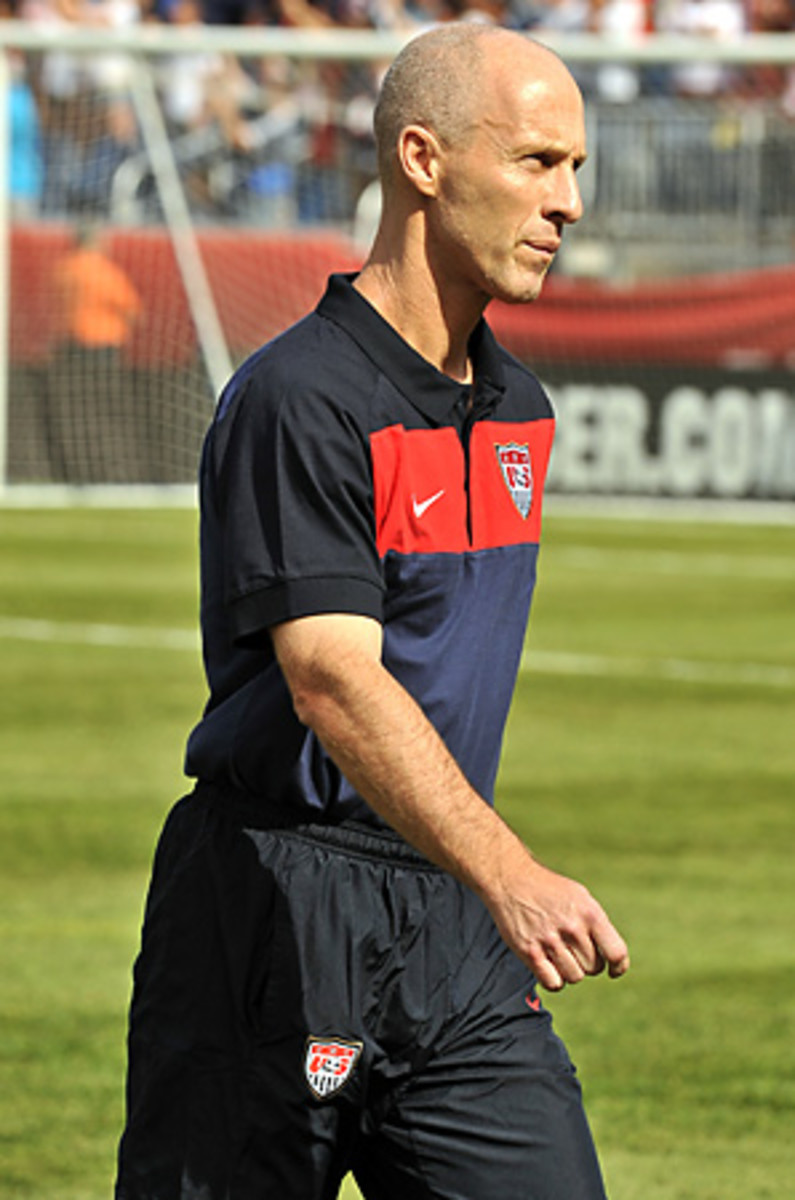
Bradley faces high-pressure stakes against Guadeloupe in Gold Cup
KANSAS CITY, Kan. -- Here's what Tuesday's U.S. game was supposed to be: a meaningless Gold Cup group-stage finale against Guadeloupe (9 p.m. ET, Fox Soccer, TeleFutura), a tiny Caribbean island that (as part of France) isn't even allowed to compete in World Cup qualifying.
And here's what it is now: a gut-check game against a deceptively tough opponent that (in the wake of the U.S.'s shocking 2-1 loss to Panama on Saturday) has raised the stakes in a big way for the American players and for coach Bob Bradley.
On only two previous occasions -- last year's World Cup games against Algeria and Ghana --has Bradley known that a loss in that match could mean the end of his U.S. coaching tenure. Bradley's boss, U.S. Soccer president Sunil Gulati, is well-known for his reluctance to replace coaches in the middle of a four-year World Cup cycle, but a second straight defeat on home soil to a lightly-regarded foe might be too much for Bradley to survive, especially if it knocked the U.S. out of the Gold Cup.
Of course, we've seen what happens when Bradley's teams dig themselves a hole: They often respond when it counts, as the U.S. did with its injury-time goal against Algeria last year. But the U.S.'s pattern of poor starts under Bradley is alarmingly clear at this point, and it hasn't just taken place during the past year.
On Sunday, I crunched the numbers and compared the performances of Bradley's U.S. teams over the past four years to those of Bruce Arena, who coached the Yanks from 1998 to 2006. The first thing I did was to throw out the results of friendlies, since they aren't a fair comparison. (Bradley's teams have played tougher friendlies than Arena's did, and the motivations in friendlies are different from those in official competitions, which include the World Cup, Confederations Cup, Gold Cup and CONCACAF World Cup qualifying.)
The results were revealing. While Bradley (.670 in 44 games) and Arena (.674 in 69) have almost the exact same winning percentage in official competitions, Bradley's U.S. teams have given up the game's first goal significantly more often (38.6 percent) than Arena's did (26.1 perecent). The difference is even more pronounced in official games on U.S. soil, in which they also have virtually identical winning percentages (Bradley: .870; Arena: .861) but Bradley's teams have given up the first goal 30.4 percent of the time (7 of 23 games) compared to Arena's 8.3 percent (3 of 36).
Are Bradley's U.S. teams just as successful as Arena's? Yes. (Almost eerily so.) But it's also true that Bradley's sides haven't improved on Arena's results, and they have to play from behind much more often.
Those numbers suggest that Bradley's teams deserve credit for their resolve in comebacks and that the coach makes useful in-game changes after falling behind. But they also imply that U.S. teams may not be as well-prepared as they used to be, aren't deployed ideally at the start and/or are overawed (by heavyweight foes) or complacent (when facing lower-ranked opponents) at the opening whistle.
Nor should Bradley be the only one facing questions. It's also up to captain Carlos Bocanegra and other veterans like Landon Donovan, midfielder Clint Dempsey and goalkeeper Tim Howard to make sure their teammates are ready to play.
Will they be ready here on Tuesday night? I suspect they will. But if they're not, the consequences could be huge.





